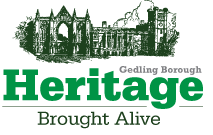Woodborough
Woodborough is an ancient settlement, known in early times as Udeburg, or Udes Fort. In the nearby Fox Wood, there is evidence of an Iron Age earthwork and hill fort, as well as of later Roman occupation.
For centuries the village was notable for farming and framework knitting. The importance of knitting declined during the 19th century as textile factories developed, although there were still 191 knitting frames recorded here in 1844. Many of the old knitters’ cottages are still recognisable from the typically large windows. As it declined, employment in the cottage knitting industry was replaced by market gardening, to provide fruit and vegetables for the growing population of Nottingham and the surrounding settlements. The village church in Woodborough, dedicated to
St. Swithun has a Norman north porch and font; the tower was built in the 1200s, with additions made in the 1400s. In the 1300s the chancel was funded by Sir Richard de Strelley, who represented Nottinghamshire in Parliament from 1331 to 1336.
A well-known villager, born in 1759 and buried in the churchyard in 1833, was the Reverend George Brown, son of a local framework knitter, who became an itinerant preacher and was known as the ‘Walking Concordance’ because of his deep knowledge of the Bible. The old vicarage on Lingwood Lane has a bell tower; by tradition, the bell is rung at 11am on Shrove Tuesday to tell the housewives of the village to prepare the pancake batter. The Woodborough
Festival, originating from the Frumenty Feast, is held on the first Sunday after July 2nd. The festival takes the form of a special service, followed by sports and teas for the children as well as by a small fair and by steam engines. Another celebration takes place on Plough Monday, when ploughboys traditionally used to enact a Mummers’ play.
Numerous heritage agricultural buildings have survived. Hall Farmhouse was built from brick in 1710. The Manor stables are a Grade II-listed structure on Main Street, built in 1878 to house racehorses. The stables fell into disuse in 1986 and the site has since been converted for housing, in 1832 there were four ale houses in Woodborough. Although the village has grown considerably, there are now just two pubs. The Four Bells was rebuilt by Home Brewery in the Arts and Crafts style in 1927.
Farming and market gardening are still prominent occupations, although most residents now are commuters.
